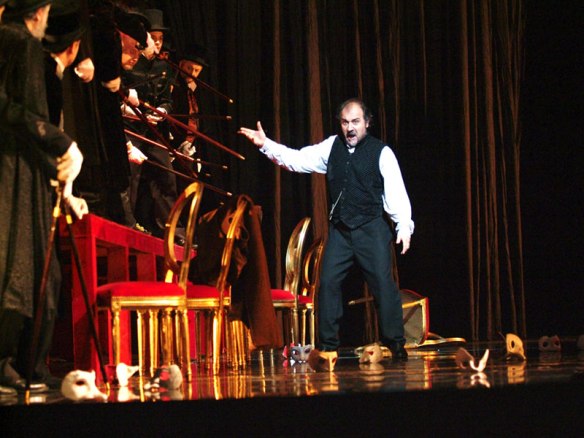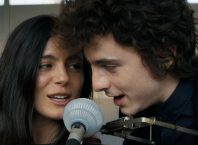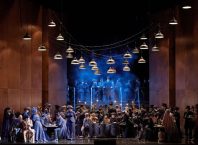Revenge is the subject of the next opera to be staged in Tel Aviv and other select locations across Israel. It takes place in the court of a frivolous, womanizing duke, where Rigoletto is the Duke’s disfigured, disgruntled court jester. You may remember this production from the 2011-2012 season, also starring Baggio and Almaguer, which won excellent reviews.
The opera takes place in the court of the Duke of Mantua, a young and frivolous ruler who spends his time womanizing and throwing lavish parties for his courtiers. The jester Rigoletto hates life at court but has an important person to come home to – his daughter, who is kept hidden from the outside world. At one of the Duke’s parties, Rigoletto mocks Count Ceprano, whose daughter is being harassed by the courtiers. The Count curses him – a father’s curse. This curse – “La Maledizione” – will send Rigoletto down a terrible path of vengeance and violence, ending in tragedy.

Not quite a victim but not truly a villain either, Rigoletto toys with our emotions, making us cheer for his vendetta one moment and hate him for it the next: he mocks the courtiers mercilessly – but this is what he’s paid for; he begs for their mercy – and then curses their entire race; he plots the Duke’s murder – but this is done to avenge his daughter’s honor; even his great aria of revenge, “Si, vendetta, tremenda vendetta”, which follows the Act II duet with Gilda, is borne out of the tender words he speaks to her.
Verdi, giving music to these troubled characters, might have given the role of Rigoletto to a bass, which was more popular at the time in Italian opera. Instead he crafted the jester as a baritone – between a tenor, associated with heroes, and a bass, associated with villains – blending the warring aspects of Rigoletto’s character not only in words, but also in music. Rigoletto would join the ranks of Verdi baritone roles that have been driving audiences wild ever since: the Conte di Luna, Rodrigo the Marquis de Posa, Falstaff, Macbeth – all diverse and scintillating characters.
It’s a demanding role, physically as well as emotionally: Rigoletto is a hunchback, and the costume often necessitates the singer hobbling across the stage sporting a hunch and a limp. For years, Verdi baritones have been putting their own spin on the vocal demands of the role, creating, for example, the precedent of singing an A flat – and sometimes even a high A natural! – on the final notes of the opera: “Ah, la maledizione!” (“Ah, the curse!”):
Rigoletto can certainly be classified as a revenge tragedy, but the opera’s comic scenes are just as powerful as the tragic. Where Verdi quickly moves from one genre to the other, you can usually find a moment of dramatic importance: the overture, for instance, is recognizable by its ominous C minor theme, and just as our ears are hit with its final dramatic chords, the music changes to the lively, playful melody of the Duke’s party scene, which opens the opera.
Though Rigoletto is the opera’s protagonist, we should never forget the tenor role which brought us “La donna è mobile”, here sung, in a dazzling recording from 1971, by a Pavarotti at the height of his powers (which includes a high D at the end):
Who is this happy, carefree and yet ultimately sinful Duke? Rigoletto is based on Victor Hugo’s Le roi s’amuse, which in turn is based on several historical figures. The Duke is based on Francis I of France, who, like the Duke in Verdi’s opera, also had a habit of dressing up in simple clothes to woo lower-class girls. Rigoletto is Triboulet, his court jester, who in the play becomes a Machiavellian schemer. In Hugo’s play he is already a complex character: grotesque, deformed and treacherous, and yet at the same time a loving father who cannot bear to be separated from his daughter. For the Italian version of the play, Verdi’s librettist Francesco Maria Piave had to change the names of the characters in order to avoid the censors.
The upcoming Rigoletto will be full of familiar faces. Mexican baritone Carlos Almaguer will return to sing the title role – his second performance in Israel. Almaguer can often be heard in European opera houses – he arrives fresh from a string of performances as Amonasro, and has sung many of the great Verdi baritone roles: Nabucco, Simon Boccanegra, Macbeth, Iago, and more.
Hila Baggio, as Gilda, is perhaps one of Israel’s finest operatic stars. She is a graduate of the Rubin Academy in Tel Aviv and of the Opera Studio. She recently performed Norina in Don Pasquale, alternating with Shiri Hershkovitz, and has even created an Israeli operatic role: the Child in Gil Shohat’s The Child Dreams.
Three tenors will sing the role of the capricious Duke of Mantua: in his first performance at the Israeli Opera, Ivan Magrì; returning to us after two years (during which he made his debut at the Met!) is Jean-François Borras; and last but not least the talented Given Nkosi, a graduate of the Israel Opera’s Meitar Studio. As the sell-sword Sparafucile and his sister Maddalena we have Vladimir Braun and Na’ama Goldman, respectively.
Is this a good opera for first-timers? During the last run of this production, in 2012, I took along a group of friends, several of which had never been to an opera. Thanks to the exciting and relatively fast-paced plotline, the straightforward staging by Pountney, the lighter-than-air trills of Ms. Baggio, and Almaguer’s clarity of tone, we went home happy. Before that, Pountney’s Rigoletto was staged in Israel in 1999 – this writer’s first live opera.
Rigoletto premieres tomorrow, May 21, at the Tel Aviv Performing Arts Center. For more details, call the Israel Opera at 03-692-7777 or visit the website: www.israel-opera.co.il.





